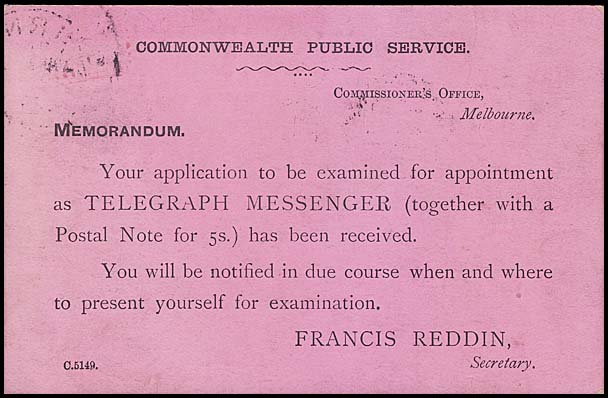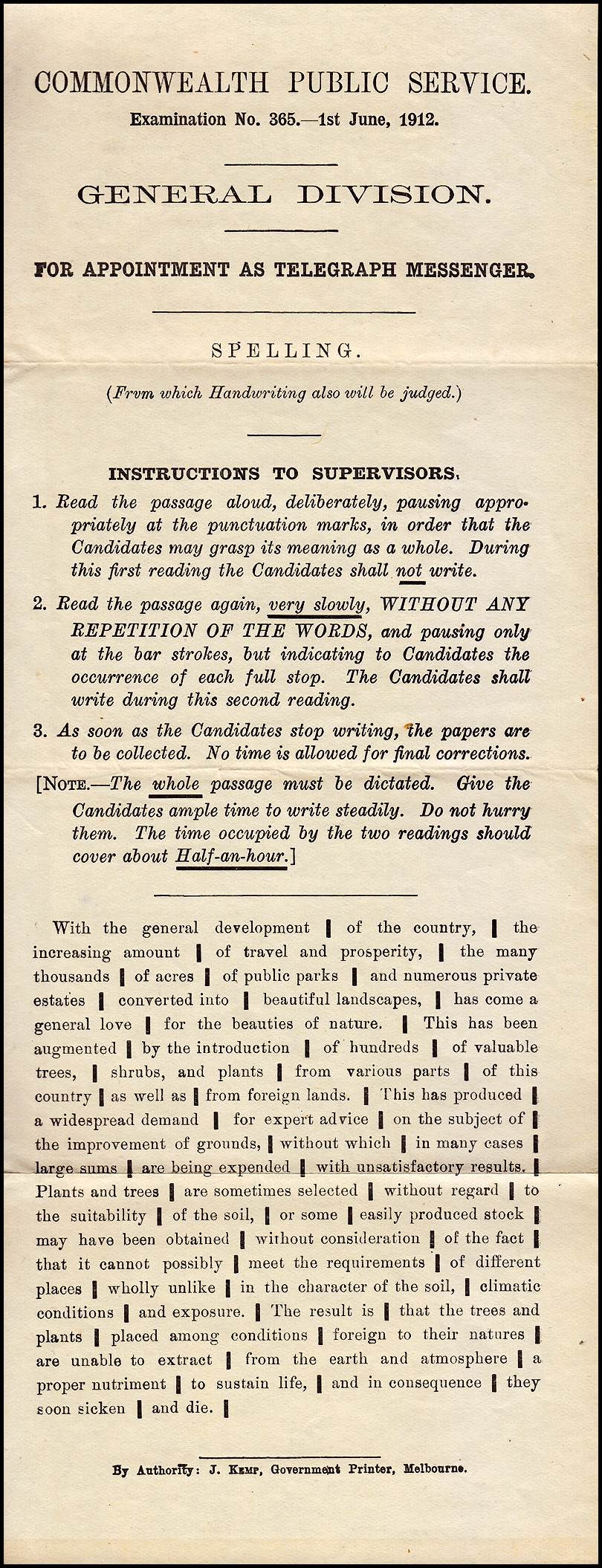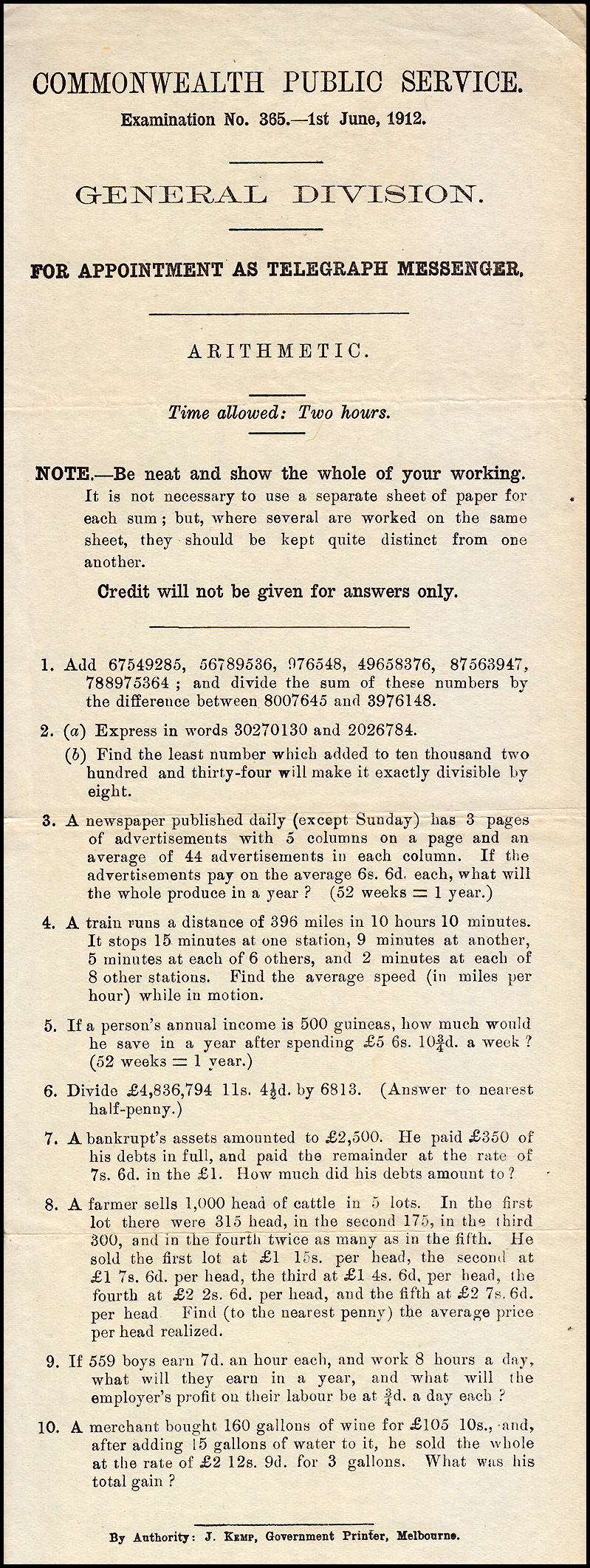Delivery form: A-DO-12.
- Home, index, site details
- Australia 1901-1988
- New South Wales
- Overview of NSW
- Telegraph lines
- Telegraph Offices
- Date stamps
- Forms
- Envelopes
- Rates
- Stamps
- Queensland
- Overview of Qld
- Telegraph lines
- Telegraph offices
- Date stamps
- Forms
- Envelopes
- Rates
- Stamps
- South Australia
- Overview of SA
- Telegraph lines
- Telegraph Offices
- Date stamps
- Forms
- Envelopes
- Rates
- Stamps
- Tasmania
- Overview of Tasmania
- General developments
- Reports
- Organisation
- Telegraph lines
- Telegraph Offices
- Date stamps
- Railway lines
- Forms
- Envelopes
- Rates
- Stamps
- Overview of Tasmania
- Victoria
- Overview of Vic.
- Telegraph lines
- Telegraph offices
- Date stamps
- Forms
- Envelopes
- Rates
- Stamps
- Ephemera
- Western Australia
- Overview of WA
- Telegraph lines
- Telegraph Offices
- Date stamps
- Forms
- Envelopes
- Rates
- Stamps
The recruitment of Telegram Messengers was a very formal process involving:
- advertisements in newspapers and the Gazette;
- formal selection tests in spelling and arithmetic;
- official notification.
Sometimes advertisements for messengers were very brief - the South Australian Register of 23 January 1875 carried the following:
WANTED, a smart lad for EXCHANGE TELEGRAPH MESSENGER.
Apply to Green & Co., King William Street.
A subsequent advertisement a year later added "must be able to write well" at the end of the first line.
In 1904, the Commonwealth advertised that tests would be held throughout Australia in January 1904. In addition to vacancies in the clerical division and telephone operators, the number of Telegraph Messengers anticipated to be recruited in 1905 and the first part of 1906 were:
| State | No. of messengers |
| Sydney & surburbs | 220 |
| Brisbane & surburbs | 20 |
| Adelaide & surburbs | 27 |
| Hobart & surburbs | 20 |
| Melbourne & surburbs | 80 |
| Perth & surburbs | 30 |
The Daily Herald of 23 August 1915 carried the following notice:
"An examination for telegraph messengers will be held on Saturday October 2 1915. All new appointees will receive £39 per annum and after 12 months service £52; and on passing a telegraphic test, the income will be further advanced to £60 a year as telegraph messenger of £72 per annum as postal assistant".
 |
The conditions of employment of Telegraph Messengers were at first unspecified. For example, in a letter to the Editor of the Australasian on 13 May 1865, the correspondent asked: "Will you be good enough to inform me the date on which the Civil Service Act became law, and whether Telegraph Messengers previously appointed, are entitled to the benefits and privileges of the said act, or whether, before becoming so, they will have to pass the Civil Service Examination and oblige".
The Editor replied: "The Civil Service Act received the Royal Assent on the 18th June, 1862. Only a portion of its provisions, however, apply to messengers. These officers are classed in the third schedule appended to the Act, and itis expressly provided that only such portions of it as relate to compensation for loss of office, penalties and dismissals, superannuation and a few others, shall apply to persons so classed. The provisions of the Act relative to examinations do not, therefore, apply to messengers no whatever department they may belong".
The two formal test which applicants for the position of Telegraph Messenger had to complete were for Spelling and for Arthmetic. The front pages of the 1912 versions of these two tests follow:
 |
 |
The results of the selection tests for Messengers were most important and well regarded. They were summarised in thenewspapers - both local and State wide.
For example, the Port Lincoln Times of 9 December 1938 reported:
PORT LINCOLN EXCELS
RESULTS OF TELEGRAPH MESSENGER EXAMINATIONS
"The successes of Port Lincoln competitors have often been noted, and it is pleasing to report that in the examinations for telegraph messenger held on November 5, Port Lincoln candidates again led the field. For instance, the top boy, Ronald Theodore Roberts, of Port Lincoln, gained 362 marks — a total equalled by only one other (Keven Patrick McBride of Snowtown). Kenneth Walter McVicar was beaten by two others, John Frances Laredo, of Naracoorte,and Alexander Kenneth Ogilvy of Gladstone. Most gratifying for all the Port Lincoln entrants is a comparison of the average marks obtained by boys examined from different towns. The average marks gained were: — Port Lincoln boys 332, Gladstone 317, Naracoorte 312, Snowtown 312, Bute 303 and Jamestown 294".
For example, in the Perth Sunday Times for 9 December 1906, the following story was carried on page 5:
Telegraph Examinations.
MELBOURNE, Saturday.
Results for Telegraph Messengers have been made available.
Walter Leslie Wurnes of Broad Arrow (W .A.) is on top, with 585 marks, this being only 15 below the possible.